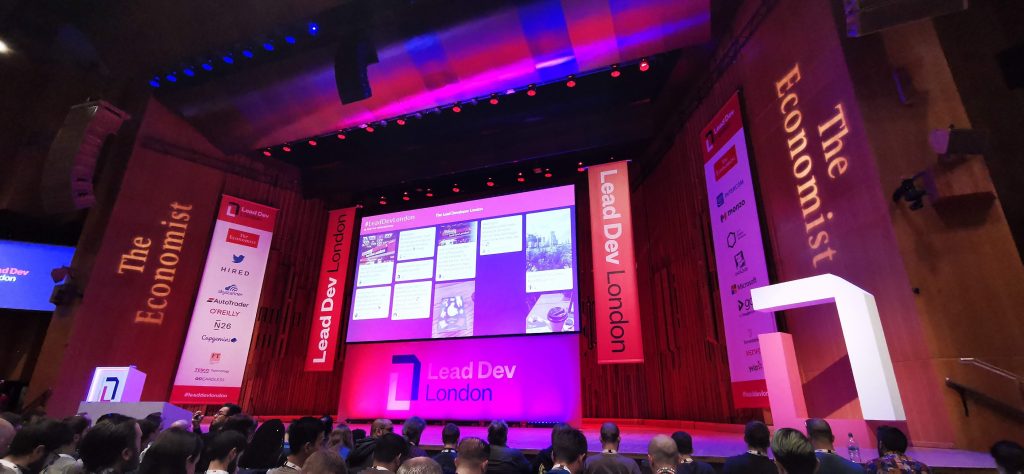
This marks my second time at LeadDev London 2019, and you'll see from my tweet stream, I get somewhat enthusiastic. The conference was (if possible) even more inclusive, diverse, and welcoming this year - made even more so with it's positioning during pride month (Meri highlighted it was a fluke, though she also said that in previous years about bigger political upheavals that overlapped with the conference - I feel there are too many coincidences here! :))
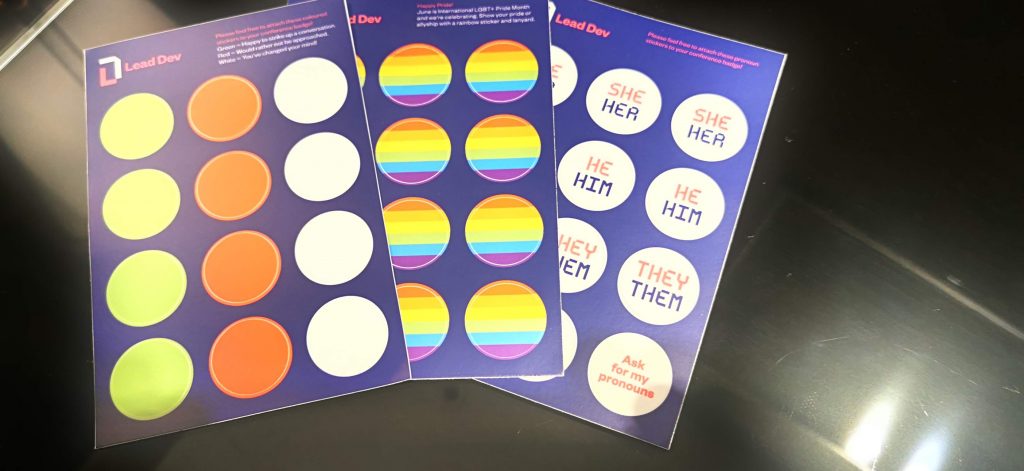

I have to call out the badge adornments. Upgrading to a pride lanyard, and giving both my communication preferences and pronouns on my badge was an awesome touch - I truly hope all conferences follow this model. This was only a drop in the ocean on the inclusivity though - a creche, an alcohol free room, a quiet room, a prayer room - so much to absolutely adore about the approach and care that is taken to looking after humans.
My leadership journey over the past 12months between LeadDev 2018 and this year has been an interesting one and has seen me move from an engineering lead in a relatively small company to one of the biggest global pharma companies. Lots of personal growth, lots of exposure, loads of challenges - it's been a blast.
This years' LeadDev for me was underpinned by a few core themes, and each resonated:
- Inclusion and Diversity - Let's get it out in the open - I'm from the demographic that is part of the problem. I'm a CIS gendered, middle class, middle aged white man. I'm an ally to the LGBTQ+ community as actively as able (my trans son helps a lot with that), and I thought I was an ally to the rest of the diversity spectrum, though this conference has really highlighted that in my position of privilege there is so much more I can do. I was lucky enough after the conference to attend and be welcomed at a talk on feedback at London Tech Ladies user group, and it was tragic to hear just how bad some of the ladies there had it in the workplace. I&D is, thankfully, handled very well at GSK, but LeadDev coupled with the meetup has reminded me that I need to be more proactive and engaged in my support (with permission) of more diverse groups.
- Psychological Safety and Org Culture - it was heartening to see time and again in talks these referenced or referred to. Anyone who's had a conversation with me knows I'll talk till the cows come home around these subjects. Vulnerability, courage, and helping people to bring their whole selves to work is waaaay more important than the actual tech. It ran as a golden thread through the whole conference and was hugely comforting to hear. It's essential to any effective organisation.
- Feedback and High Performing Teams - it felt great to reflect on a lot of the practices and approaches highlighted by speakers. Things that seemed to work well for them with regards to engaging and investing in the people within the org, and a lot of them were aspects we'd already adopted (or adapted) to some success. It feels like there's perhaps a tale from the trenches from our own experiences here that may well be valid to listen to.
- Artificial Intelligence - a subject I have little awareness of, but that I've seen a few times since joining GSK, I have a healthy tech scepticism in interacting with a bot that tells me I'm “looking peaky”. The cold chills run abound at this. Happy to talk to AI when interacting with my bank or tracking a missing order on amazon, but I draw the line at my healthcare. S'the future though innit :)
Some of the best talks for me that it's worth highlighting. I'll include links to the videos as soon as they're available.
Navigating Team Friction
Lara Hogan (@Lara_Hogan) (video)
Some great lessons based around Tuckman's stages of group development when navigating team friction, and some great references to emotional intelligence as a basis of communication (the amygdala hijack has had us all as it's slave for far too long!). Rarely is there a tiger in the room when we react badly to something - the classic conundrum demonstrated being the emotive subject of 'desk moves'! A great example followed, giving surgeons who perform the same procedure across multiple hospitals and perform it multiple times, yet performance only really ever seemed to rise significantly in the surgeons home hospital. The outcomes highlighting the importance of team interaction, trust, workflows etc. - performance is so much more than just hiring a group of “rockstars” and hoping for the best.
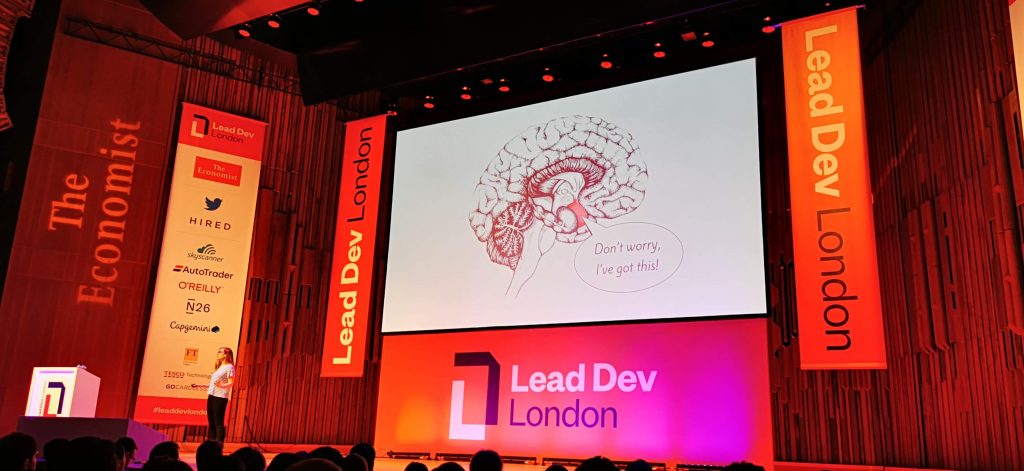
BICEPS
I loved the BICEPS model highlighted when looking at our core needs at work:
- Belonging - community, connection, a group, a tribe
- Improvement/Progress - towards purpose, improving the lives of others, meeting KPIs/OKRs
- Choice - flexibility, autonomy, decision making
- Equality/Fairness - access to resources/info, equal reciprocity. When something isn't fair we will as a species literally riot
- Predictability - of resources, time, direction, and future challenges. Be careful though, too much and we get bored. Too little, and our amygdala comes out to play!
- Significance - status, visibility, recognition
“Knowing and addressing peoples core needs is a shortcut to making others feel understood and valued”
Feedback
I've followed Lara's 1:1 guidance for some time, and found the question around 'how do you like to receive feedback' really useful in all 1:1s with new staff. The model that Lara proposed for feedback feels similar to others I've seen, but immediately applicable.
- Observation - of a behaviour or action. Make it purely factual
- Impact - of that behaviour. Share how you feel, but share it in a way they will care about it.
- Open Question or Request - in talking to adults, they're already thinking about next steps, so you can ask a genuinely open/curious question “What do you hope will be the result of your actions in the meeting?” Generally, asking a question like this reveals so much more to feed into the shared pool of meaning in that conversation. You can make a request at this stage, but Lara highlighted an open question often worked best.
Self Care
Take care of yourself - distance yourself from an unhealthy work environment. Everything covered will help navigate team friction, but it won't help solve a bad environment. If you're in that kind of environment, your interpersonal risk should not be at jeopardy if you're in an unhealthy environment.
Bottom up with OKRs
Whitney O'Banner (@WooBanner) (video)
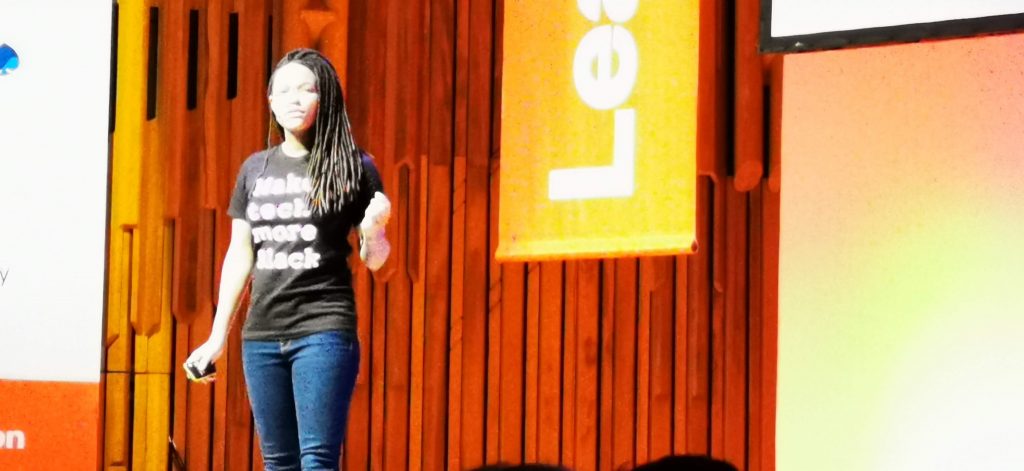
The best t-shirt of the day (and I was wearing my 'Software is Made by Humans' t-shirt!) - Whitney was wearing the amazing "Make tech more black" t-shirt! Any talk on Objectives and Key Results (OKRs) that starts with “Google got it wrong!” is going to grab anyones attention! This was an amazing talk, and I'd urge you to watch it. Challenging the status quo on a number of commonly held conceptions around OKRs and really made me think (and will absolutely generate discussion and change in our OKR process at work!)
Key takeaways
- Skip Individual OKRs
Thankfully we already do this - OKRs down to the individual level just felt like bureaucracy and overly heavy process. Individual OKRs were likened to corporate meetings - they slow us down and don't give us the bigger picture. How can we improve them? We can't, just ditch them. If you need something at that level, go to 'tasks' instead. - Ignore the metrics
When first introducing OKRs, it's hard enough to get the structure, the approach, and the alignment - don't sweat the measurement detail too much. You want to improve X by 20%? Why 20%? Is that a stretch goal? Why not 30%? Whitney used the term SWAGS (Sophisticated Wild Ass Guesses) - awesome! - Avoid Cascading Goals
Heresy! This was Whitney's key point - if you drop nothing else, drop this! Shouldn't our goals align with the company? No... (just kidding, yes). You should absolutely want to achieve your company goals. Laszlo Bock (Googles former VP of people operations) said: “Having goals improves performance. Spending hours cascading goals up and down the company, however, does not. It takes way too much time and it’s too hard to make sure all the goals line up.” Managers tend to over value their ideas by 42%. Frontline employees tend to under value theirs by 11%. Let the frontline employees decide on 'how' they'll align and add value. Bottoms up!
Inclusion stars with I
Dora Militaru (@DoraMilitaru) (video)
I wish this had been a longer talk (it was one of the 10minute slots) - it was, as a middle aged, able bodied, CIS gendered white man, a revelation. I've felt lucky to have more chance to support and ally the LGBTQ+ community, but this talk really highlighted to me how much more I need to do across all of the inclusion and diversity spectrum. Tech can still be a hostile place. We have male dominated job descriptions, male dominated interview processes. Some people have to work 10 times as hard in tech to do well. FT release an I&D report that I shall be reading and trying to action my own improvements.
If you read this and feel that things like diversity quotas are anti-meritocratic, double check your privilege - you may well be part of the problem. There were, however, two problems highlighted with quotas:
- Fixing diversity is not the HR teams responsibility, and quotas tend to lie with them
- They can trick us into thinking we've fixed the problem when we've hit the target
Nine out of ten women still work in jobs where the men are paid more for the same job. I loved the quote: “Quotas may be the only way of achieving, eventually, a world where quotas are obsolete”. Paying lip service to diversity has to end - implementation is key.
Tech seems to be particularly bad for this - in a recent Stack Overflow survey it was highlighted that 34% said that diversity was their lowest priority when looking for a new job.
So many references flooded out at the end:
- If minorities aren't applying, fix it - you can do so
- Advocate actively
- Become an ally!
- pronoun.is and tampon.club were examples given
- If you worry that you don't know on something, ask - the worst thing you can do is remain silent
- If you're in a room making a decision and everyone in the room looks like you, that's a warning sign
- Celebrate diversity!
Ola Sitarska (@OlaSitarska)'s talk on an inclusive hiring process resonated a lot with the above and added some further context for me too and shouldn't go without mention.
Facilitation Techniques 202
Neha Batra (@NerdNeha) (video)
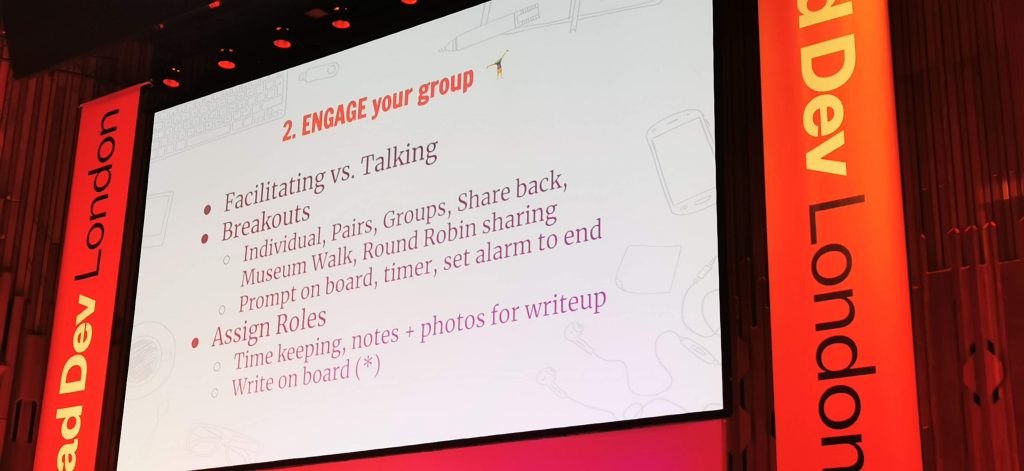
I'm not even going to try to write this one up, but will update as soon as the video is out. I made so many scrambled notes, but it was awesome. If you facilitate anything in your working life, this had so much practical, tangible, actionable advice. How can a talk that mentions 'Post-It Super Sticky Portable Tabletop Easel Pad with Dry Erase Panel' be wrong? Honestly, watch it :)
Special Mention
To the end of day one story telling of Nickolas Means (@Nmeans) who gave us a thorough history of Eiffel's Tower, and tied it back to organisational politics and relationship building.
The end of day two saw the amazing Clare Sudbery (@ClareSudbery) and Dr Sal Fredenberg (@SalFreudenberg) talk about an incredible array of topics pivoting around a hackathon where they invented time travel... no, really! Watch it - both amazing speakers, and they delivered their content superbly. I learned of the spoon theory during this, and have already used it in defining my own energy levels in a conversation after 3 back to back days in London - loved it. Oh, and they came onto the stage to the amazing Polystyrene and X-Ray Spex 'Oh Bondage, Up Yours!' - what's not to love!